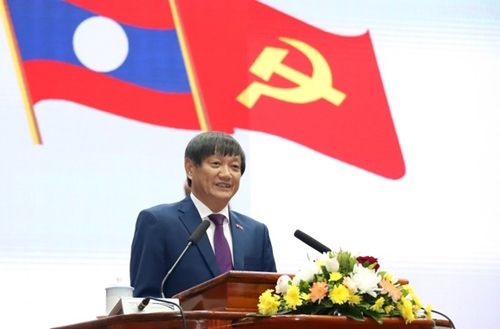Ambassador Nguyen Ba Hung described the victory as a testament to the great friendship and special solidarity between the two countries’ parties, states and peoples, especially their armed forces.
    |
 |
|
Vietnamese Ambassador to Laos Nguyen Ba Hung speaks at the event. |
He delved into the reasons why it is rightfully considered a joint triumph of Vietnam, Laos and the entire Indochina. Describing it as the most decisive and important victory of a long and intense military campaign waged by the Vietnam-Laos-Cambodia combatant alliance, he highlighted the close coordination between the Vietnamese volunteer forces and the Lao army and its people, particularly during the Upper, Middle, and Lower Laos campaigns.
Without the victories secured on the Upper, Middle, and Lower Laos fronts, the battle at Dien Bien Phu would have undoubtedly been far more challenging and costly, he asserted, noting that the sacrifices and losses would have been even greater, and Laos's liberation efforts would have been greatly hindered.
The Dien Bien Phu Victory ultimately led to the signing of the 1954 Geneva Accords which brought an end to hostilities, restored peace in Indochina, and recognized the independence, sovereignty and territorial integrity of Vietnam, Laos, and Cambodia. This opened a new historical phase in the cooperation and combatant alliance between the two countries against American imperialists, he added.
The diplomat concluded by expressing his belief that the historical lessons from the victory remain relevant and serve as a source of inspiration for both nations as they continue on their respective paths of national defence and development.
Source: VNA